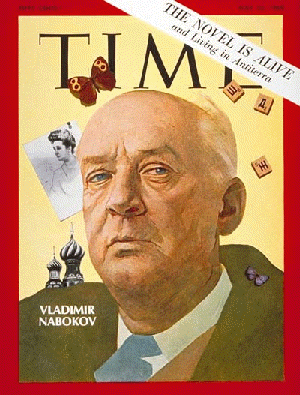-
|

|
Chapter 10: Late Twentieth Century and Postmodernism
Vladimir
Nabokov
1899-1977
|
©
Paul Reuben
September 15, 2019
E-Mail
|
Page Links: |
Primary
Works |
Selected
Bibliography 2000-Present
| MLA
Style Citation of this Web Page
|
Site
Links: | Chap. 10: Index | Alphabetical
List
| Table
Of Contents
| Home
Page
|

Source: TIME
Nabokov lived in the USA
from 1940-1961. Here are the details of his American
years:
In 1940, VN, Véra,
and Dmitri, fled Paris for New York, narrowly escaping the invading
Germans. In America, VN initially worked for the Museum of Natural
History in New York, classifying butterflies. He published two
papers, and was also paid by the Museum for his entomological
drawings. During the summer of 1941, he taught creative writing at
Stanford University, before securing an appointment as resident
lecturer in comparative literature and instructor in Russian at
Wellesley College. Later he would work at Harvard, first in an
entomological capacity and later as visiting lecturer, and at
Cornell, as professor of Russian and European literature, from
1948-1958.
During the 1940s, VN
embarked upon a fruitful association with the New Yorker; in addition
to his entomological work, he spent quite a bit of time preparing his
lectures, and published a scholarly work on Gogol. It may be that his
comparatively small output of fiction during this time was an
adjustment to writing in English; VN would maintain that the
Wellesley years were the happiest, and his scholarly pursuits were
satisfying. In 1945, the Nabokov family became American citizens. He
also compiled a memoir, published in 1951 as Conclusive Evidence
(later revised and published as Speak, Memory.)
VN continued to pursue
butterflies during his summer vacations, often in the Rocky
Mountains. It was during these trips in the early 1950s that he
composed the novel that would engrave his name in the American
popular culture - Lolita. Initially, even the American publishing
houses that admitted Lolita's literary virtues were unwilling to
discover the legal ramifications of publishing a novel about a man's
affair with his twelve-year old stepdaughter. Lolita was first
published in France by Olympia Press in 1955, and generated a storm
of moral outrage, as well as staunch and significant support for its
artistic merit. Eventually published in American in 1958 (and in
England the following year,) the Sturm und Drang over Lolita
contributed to a remarkable popular success; it spent six months as
the number one bestseller in America (displaced by Boris Pasternak's
Dr. Zhivago.)
Although he glibly suggested
about his Lolita that "she is the famous one, not I," profits from
the sale of the novel, combined with the sale of the movie rights and
a screenplay deal, enabled VN to retire from Cornell in 1959 and
devote himself to writing.
From Zembla:
VN Biography
Selected Primary
Works
The annotated
Lolita. Edited, with pref., introd., and notes by Alfred
Appel, Jr. NY: McGraw-Hill, 1970. PS3527 .A15 L63
Vladimir Nabokov:
selected letters, 1940-1977. Edited by Dmitri Nabokov and
Matthew J. Bruccoli. San Diego: Harcourt Brace Jovanovich, 1989.
PS3527 .A15 Z48
The stories of
Vladimir Nabokov. NY: Alfred A. Knopf, 1995. PS3527 .A15
A6
Novels and memoirs,
1941-1951: The real life of Sebastian knight, Bend sinister, Speak
memory an autobiography revisited. NY: Literary Classics of
the United States, 1996. PS3527 .A15 A6
Novels, 1969-1974: Ada
or ardor a family chronicle, Transparent things, Look at the
harlequins! NY: Literary Classics of the United States, 1996.
PS3527 .A15 A6
Novels, 1955-1962:
Lolita, Pnin, Pale fire, Lolita a screenplay. NY: Literary
Classics of the United States , 1996. PS3527 .A15 A6
Nabokov's butterflies:
unpublished and uncollected writings. Edited and annotated by
Brian Boyd and Robert Michael Pyle; new translations from the
Russian by Dmitri Nabokov. Boston: Beacon Press, 2000. QL542
.N33
Dear Bunny, dear
Volodya: the Nabokov-Wilson letters, 1940-1971. Edited,
annotated, and with an introductory essay by Simon Karlinsky.
Berkeley: U of California P, 2001. PG3476 .N3 Z548 2001 In
Library
Selected
Bibliography 2000-Present
Blackwell, Stephen H.
Zina's Paradox: The Figured Reader in Nabokov's Gift. NY:
Peter Lang, 2000.
- - -. The Quill and the
Scalpel: Nabokov's Art and the Worlds of Science. Columbus: Ohio
State UP, 2009.
Boyd, Brian. Stalking
Nabokov. NY: Columbia UP, 2011.
de la Durantaye, Leland.
Style Is Matter: The Moral Art of Vladimir Nabokov. Ithaca,
NY: Cornell UP, 2007.
Dragunoiu, Dana. Vladimir
Nabokov and the Poetics of Liberalism. Evanston, IL: Northwestern
UP, 2011.
Hägglund, Martin.
Dying for Time: Proust, Woolf, Nabokov. Cambridge, MA: Harvard
UP, 2012.
Hardy, James D, Jr..
'Light of My Life': Love, Time and Memory in Nabokov's Lolita.
Jefferson, NC: McFarland, 2011.
Khrustcheva, Nina L.
Imagining Nabokov: Russia Between Art and Politics. New Haven,
CT: Yale UP, 2008.
Ladenson, Elisabeth. Dirt
for Art's Sake: Books on Trial from Madame Bovary to Lolita.
Ithaca, NY: Cornell UP, 2007.
Leving, Yuri. Marketing
Literature and Posthumous Legacies: The Symbolic Capital of Leonid
Andreev and Vladimir Nabokov. Lanham, MD: Lexington, 2013.
Mazierska, Ewa. Nabokov's
Cinematic Afterlife. Jefferson, NC: McFarland, 2011.
Mooney, Susan. The
Artistic Censoring of Sexuality: Fantasy and Judgment in the
Twelfth-Century Novel. Columbus: Ohio State UP, 2008.
Nafisi, Azar. Reading
Lolita in Tehran: A Memoir in Books. NY: Random House,
2003.
Naiman, Eric. Nabokov,
Perversely. Ithaca, NY: Cornell UP, 2010.
Pitzer, Andrea. The
Secret History of Vladimir Nabokov. NY: Pegasus, 2013.
Rampton, David. Vladimir
Nabokov: A Literary Life. NY: Palgrave Macmillan, 2012.
Rutledge, David S.
Nabokov's Permanent Mystery: The Expression of Metaphysics in His
Work. Jefferson, NC: McFarland, 2011.
Uhlmann, Anthony.
Thinking in Literature: Joyce, Woolf, Nabokov. NY: Continuum,
2011.
Zanganeh, Lila A. The
Enchanter: Nabokov and Happiness. NY: Norton, 2011.
MLA Style
Citation of this Web Page
Reuben, Paul P.
"Chapter 10: Vladimir Nabokov." PAL: Perspectives in American
Literature- A Research and Reference Guide.
URL: http://www.paulreuben.website/pal/chap10/nabokov.html
(provide page date or date of your login).
| Top
|

